

7 Things We Don't Know About the Ocean. THE OCEAN CLEANUP - Feasibility Study. Our Oceans Are Not A Trash Can. Ocean Trash is a Problem You Can Solve. TRASH TALK Special Feature. Ghost net. For the computer malware spying operation, see GhostNet.
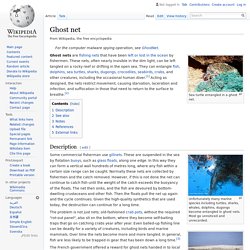
Sea turtle entangled in a ghost net. Ghost nets are fishing nets that have been left or lost in the ocean by fishermen. 20 Facts About Ocean Pollution. The ocean remains one of the most expansive, mysterious and diverse places on Earth.
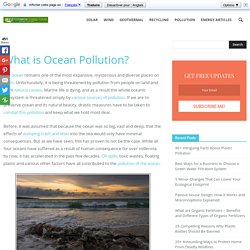
Unfortunately, it is being threatened by pollution from people on land and from natural causes. Marine life is dying, and as a result the whole oceanic ecosystem is threatened simply by various sources of pollution. If we are to preserve ocean and its natural beauty, drastic measures have to be taken to combat this pollution and keep what we hold most dear. Ocean Mixing and Pollution. 2015 Youth Summit on Ocean Plastic Pollution: SEA Change - Be Change! Pollution. Introduction of contaminants that cause adverse change Pollution is the introduction of contaminants into the natural environment that cause adverse change.[1] Pollution can take the form of chemical substances or energy, such as noise, heat, or light. Pollutants, the components of pollution, can be either foreign substances/energies or naturally occurring contaminants.
Pollution is often classed as point source or nonpoint source pollution. In 2015, pollution killed 9 million people worldwide.[2][3] Midway Island, North Pacific Ocean, Unbelievable ! World biggest garbage dump - plastic in the Ocean. Plastics in the Ocean Affecting Human Health. Author: Gianna Andrews This case study is part of a collection of pages developed by students in the 2012 introductory-level Geology and Human Health course in the Department of Earth Sciences, Montana State University.
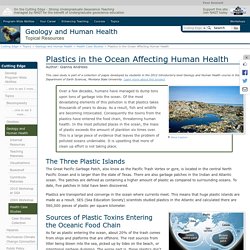
Learn more about this project. Mountain of Plastic. Photo credit: Top News, "Scientists Baffled by Mystery of Missing Ocean Plastic", Jamie Williamson, Over a few decades, humans have managed to dump tons upon tons of garbage into the ocean. Ocean Pollution- trash. Charles Moore - the Great Pacific plastic trash island. Great Pacific Garbage Patch. Ocean Pollution. How Much Plastic is in the Ocean? Stiv Wilson of the ocean conservation group 5 Gyres has made a first attempt to tally how much plastic is in the global ocean.
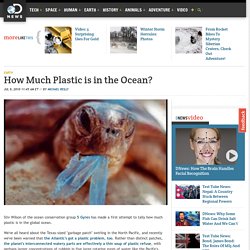
We've all heard about the Texas-sized "garbage patch" swirling in the North Pacific, and recently we've been warned that the Atlantic's got a plastic problem, too. Rather than distinct patches, the planet's interconnected watery parts are effectively a thin soup of plastic refuse, with perhaps larger concentrations of rubbish in five large rotating gyres of water like the Pacific's. The more people look, the more grim the situation looks. But how can we get our heads around how big the problem really is?
How much plastic is really in the ocean, and can we clean it up? In a new post on 5gyres.org, Wilson takes what appears to be the first-ever stab at trying to figure it out. The number he comes up with is staggering: he conservatively estimates there are 315 billion pounds of plastic in the oceans right now. Ocean pollution. Even though ocean pollution can be obvious, it is often the pollutants that we cannot see that do the most harm.
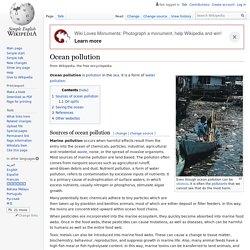
Ocean pollution is pollution in the sea. It is a form of water pollution. How Does Your Plastic Bag Get Into the Ocean? If you live hundreds of miles away from the coast, it probably never occurs to you that the plastic bag or cup lid that you toss into the gutter might make its way into the Atlantic or the Pacific.
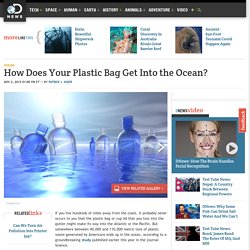
But somewhere between 40,000 and 110,000 metric tons of plastic waste generated by Americans ends up in the ocean, according to a groundbreaking study published earlier this year in the journal Science. It's difficult to pinpoint where all that refuse originates, and researchers think that much or most of it probably comes from the nation's densely-populated coastlines. But there's also evidence that the nation's inland waterways serve as a conduit for plastic to travel thousands of miles into the oceans. PHOTOS: The Great Atlantic Garbage Patch. Water pollution. Water pollution is the contamination of natural water bodies by chemical, physical, radioactive or pathogenic microbial substances.
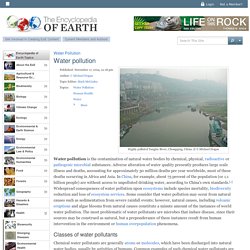
Adverse alteration of water quality presently produces large scale illness and deaths, accounting for approximately 50 million deaths per year worldwide, most of these deaths occurring in Africa and Asia. In China, for example, about 75 percent of the population (or 1.1 billion people) are without access to unpolluted drinking water, according to China's own standards.[1] Widespread consequences of water pollution upon ecosystems include species mortality, biodiversity reduction and loss of ecosystem services.
Some consider that water pollution may occur from natural causes such as sedimentation from severe rainfall events; however, natural causes, including volcanic eruptions and algae blooms from natural causes constitute a minute amount of the instances of world water pollution.
Oil Spills: Impact on the Ocean - sea, effects, temperature, percentage, important, largest, types, source, marine, oxygen, human. Oil wastes that enter the ocean come from many sources, some being accidental spills or leaks, and some being the results of chronic and careless habits in the use of oil and oil products.
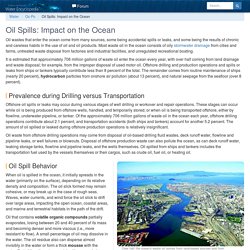
Most waste oil in the ocean consists of oily stormwater drainage from cities and farms, untreated waste disposal from factories and industrial facilities, and unregulated recreational boating. It is estimated that approximately 706 million gallons of waste oil enter the ocean every year, with over half coming from land drainage and waste disposal; for example, from the improper disposal of used motor oil. Offshore drilling and production operations and spills or leaks from ships or tankers typically contribute less than 8 percent of the total. The remainder comes from routine maintenance of ships (nearly 20 percent), hydrocarbon particles from onshore air pollution (about 13 percent), and natural seepage from the seafloor (over 8 percent). Oil and Chemical Spills. NOAA brings scientific expertise to the table On Jan. 8, 2010, the U.S.
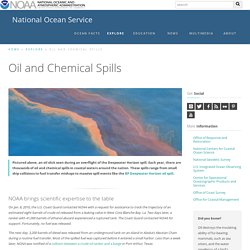
Coast Guard contacted NOAA with a request for assistance to track the trajectory of an estimated eight barrels of crude oil released from a leaking valve in West Cote Blanche Bay, La. Two days later, a tanker with 41,000 barrels of ethanol aboard experienced a ruptured tank. The Coast Guard contacted NOAA for support. Fortunately, no fuel was released. The next day, 3,200 barrels of diesel was released from an underground tank on an island in Alaska’s Aleutian Chain during a routine fuel transfer. All of these events occurred within one two-week period. Oil in the Ocean. Transcript Last summer, in the heart of New Orleans, a 600-foot tanker collided with a 200-foot fuel barge, tearing the barge in half.
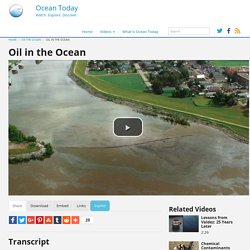
Several hundred thousand gallons of oil leaked out of the barge and into the fast-flowing Mississippi River, heading quickly towards the ocean. The oil spread down the river in minutes, immediately threatening drinking water intakes and wildlife. Responders sprang into action within hours of the accident. Using computer models and weather forecasts, they determined the path of the spill. Specialized boats with oil collection devices on their bows were sent to the scene. Noxious fumes from oil harm animals that can’t avoid it, and others can be covered in it—leading to suffocation and death. Facts About Oil Spills in the Ocean. Oil Spills in the Ocean and Oil Pollution. FAQs : Oil in the Ocean. Marine problems: Pollution. Seas of garbage Solid garbage also makes its way to the ocean. Plastic bags, balloons, glass bottles, shoes, packaging material – if not disposed of correctly, almost everything we throw away can reach the sea.
Plastic garbage, which decomposes very slowly, is often mistaken for food by marine animals. Ocean Oil Spills. Impact of oil spills in the U.S. Arctic Ocean from oil and gas development One of the most significant threats to life in the Arctic from industrial activities is the risk of an oil spill. Alaska’s Arctic Ocean and Bering Sea experience some of the most extreme weather conditions on earth, from high winds and seas to long periods of darkness amidst subzero temperatures.
Harsh weather alone can significantly delay clean-up efforts. In addition, adequate technology to clean up oil spills in broken ice has not been proven to work in ice conditions typical of the U.S. The federal Bureau of Ocean Energy Management, Regulation and Enforcement's Environmental Impact Statement for its 2007-2012 off-shore oil and gas leasing plan predicts at least one large spill in Bristol Bay and two large spills in the U.S.
Ocean Pollution. Great Pacific Garbage Patch - Ocean Pollution Awareness. Ocean Pollution - Save Our Marine Life. Marine Plastic Pollution (NatGeo) Plastic pollution in the ocean. Ocean Pollution 1. The World Ocean "Trashed" Ocean Pollution Awareness. Plastic Planet. The Problems and Causes of Ocean Pollution. Ask Producers to Help Save our Seas and $8 billion per year! This Floating Bucket Could Be A Solution To Ocean Pollution - Newsy. Top 10 Facts About Plastic Pollution In Our Ocean. Ocean pollution. Stop Ocean Pollution. How Oil Harms Animals and Plants in Marine Environments. The type of oil spilled matters because different types of oil behave differently in the environment, and animals and birds are affected differently by different types of oil. However, it's not so easy to say which kind is worst.
First, we should distinguish between "light" and "heavy" oils. Fuel oils, such as gasoline and diesel fuel, are very "light" oils. Light oils are very volatile (they evaporate relatively quickly), so they usually don't remain for long in the aquatic or marine environment (typically no longer than a few days). If they spread out on the water, as they do when they are accidentally spilled, they will evaporate relatively quickly.
However, while they are present, light oils present two significant hazards. In contrast, very "heavy" oils (like bunker oils, which are used to fuel ships) look black and may be sticky for a time until they weather sufficiently, but even then they can persist in the environment for months or even years if not removed. Plastic Pollution In The Ocean. Turtles in Danger because of Ocean Pollution. How Does Water Pollution Affect Humans? - The World Counts. Ocean Pollution Effects on Dolphins, Whales & Human Health - BlueVoice.org. Ocean pollution: Davos report says plastic in oceans will outweigh fish by 2050 - TomoNews. The New Way Microplastics Are Devastating Marine Life. SeaWeb - Ocean and Human Health. What the Ocean Does for Our Planet and Us While nearly half of the world's human population lives within 50 miles of a coast, all of us depend on the ocean and the resources it provides, whether it be for food we eat or the oxygen we breathe.
Top 10 Items Polluting The Oceans. Effects of Ocean Pollution on Marine Life. Ocean Pollution and Marine Mammals – BlueVoice.org. < Ocean Issues By Bob Bohle The impact of humans has now reached every square mile of Earth’s oceans, and implications are ominous for ocean creatures and humans alike. In a study released in the February 2008 journal Science, researchers found that human activity -- from over-fishing to greenhouse gases and global warming to the introduction of toxins into the environment – has affected every square mile of ocean on the planet and strongly impacted roughly 40 percent of marine ecosystems. What the study didn’t cover directly may be even more disturbing: marine mammals are suffering dramatic rises in devastating illnesses, such as nervous and digestive system problems, liver disease, contaminant-induced immunosuppression, endocrine system damage, reproductive malformations, and growth and development issues.
Marine Pollution. Causes and Effects of Ocean Pollution. Oceans are the largest water bodies on the planet Earth. How Much Trash Is In The Ocean? The World Ocean "Trashed" Water pollution: An introduction to causes, effects, solutions. By Chris Woodford. Last updated: June 29, 2015. Over two thirds of Earth's surface is covered by water; less than a third is taken up by land. Plastic Ocean: How a Sea Captain's Chance Discovery Launched a Determined Quest to Save the Oce ans: Charles Moore, Cassandra Phillips: 9781583335017: Amazon.com: Books.
The Effects of Ocean Pollution. Plastic Pollution. 10 Most Common Types Of Ocean Trash. It’s pretty impossible to go to the beach without finding a piece of trash tossing about in the surf, or half buried in the sand. Unfortunately, with monstrosities like the Great Pacific Garbage Patch swirling about offshore, it’s unlikely that our coastlines will be trash-free any time soon.
FAO - News Article: Ghost nets hurting marine environment. A sea turtle tangled in an abandoned or lost fishing net. 20 Facts About Ocean Pollution. Marine pollution. While marine pollution can be obvious, as with the marine debris shown above, it is often the pollutants that cannot be seen that cause most harm. When pesticides are incorporated into the marine ecosystem, they quickly become absorbed into marine food webs. Once in the food webs, these pesticides can cause mutations, as well as diseases, which can be harmful to humans as well as the entire food web. What is the biggest source of pollution in the ocean? Ocean Pollution. Water Pollution: Marine - effects, environmental, pollutants, United States, types, causes, soil, chemicals, industrial, liquid, toxic, human, sources, use, life, oil. Marine Pollution Bulletin. Causes and Effects of Ocean Pollution. What you can do to reduce marine pollution. Effects of Marine Pollution on Sea Plants and Animals: Examining How Types of Human Pollution Harms Ocean Life.
Chemical pollution - Marine pollution. Ocean Pollution Facts. Ocean Pollution. Ocean Plastics Pollution. What a Waste - Plastic Oceans. 10 Things You Can Do to Save the Ocean. How You Can Help the Ocean. How Much Trash Is In The Ocean? 101+ Ways to Make a Difference ~ Solutions that Protect the Ocean. National Geographic Kids. National Geographic. Water Pollution. The Ocean Cleanup, developing technologies to extract, prevent and intercept plastic pollution. National Geographic Freshwater 101: Pollution. Ghost Nets. 10 Ways to Reduce Plastic Pollution.
National Geographic. Polluted Ocean Photos. There's a Horrifying Amount of Plastic in the Ocean. This Chart Shows Who's to Blame. 20 Facts About Ocean Pollution. Ocean Pollution.